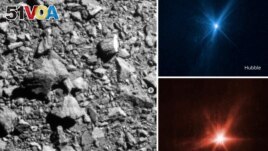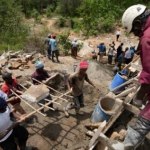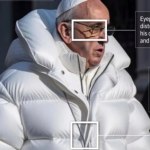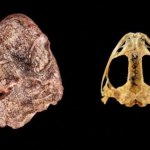28 March 2024
Scientists say new research confirms results of an earlier study suggesting the crash of a spacecraft into an asteroid changed the shape of the targeted object.
The latest research follows another recent study examining the effects of the asteroid strike. NASA crashed its DART spacecraft into the asteroid Dimorphos in 2022 in an area about 11 million kilometers from Earth.
The experiment tested a method for changing the orbit of some asteroids to prevent them from possibly crashing into our planet in the future.

FILE - This combination of images provided by NASA shows three different views of the DART spacecraft's impact on the asteroid Dimorphos on Monday, Sept. 26, 2022. (NASA via AP)
NASA has said its studies of the crash showed it was successful because the force of the strike changed the asteroid's orbit around a larger asteroid called Didymos. Data also showed the strike reduced the orbital period of Dimorphos by 33 minutes.
The team that carried out the most recent research said that in addition to changing the asteroid's orbit, it appears the crash also changed the shape of Dimorphos.
This confirms results of the earlier study, which concluded that the crash had likely "completely reshaped" Dimorphos and turned it into a relatively weak collection of "rubble." The team carrying out that study used a computer simulation system to study the changes to Dimorphos.
The new research suggests that while Dimorphos had a mostly round shape before the crash, it was reshaped by the strike into an object that looks more like a watermelon. The technical term for this kind of shape is triaxial ellipsoid, the scientists said.
Steve Chesley is a senior research scientist at NASA's Jet Propulsion Laboratory (JPL) in California. He was the co-writer of a study describing the findings that recently appeared in the publication Planetary Science Journal.
Chesley told Reuters news agency the data studied for the latest research shows Dimorphos is currently a collection of non-solid debris including dust, rocks and other materials. This state means the asteroid's "strength is quite low," permitting Dimorphos to reshape more easily than a more solid object.
The new study's lead writer was Shantanu Naidu. He told Reuters the asteroid was able to completely reshape because the strike by the asteroid turned much of its material into rubble.
The researchers based their findings on the shape and orbit of Dimorphos on observations from ground-based telescopes. They looked at how sunlight reflections off the surfaces of the two asteroids changed over time. They also used data from radio waves that hit the objects and images the DART spacecraft captured.
Researchers have said they expect to learn more about the two asteroids in the future.
The European Space Agency's Hera spacecraft plans to launch in October and reach the asteroids by late 2026. ESA says Hera's cameras and instruments will carry out detailed studies of Dimorphos and Didymos. During the operation, the spacecraft will aim to collect the most data yet on such an asteroid system.
"We are anxiously awaiting the arrival of ESA's Hera spacecraft, when we will be able to compare our modeled shape with that obtained from Hera imagery," Chesley said. He added, "We will also learn how much the orbit has changed since we last observed it in 2023."
I'm Bryan Lynn.
Reuters reported this story. Bryan Lynn adapted the report for VOA Learning English.
__
Words in This Story
asteroid – n. a rocky object that goes around the sun like a planet
rubble – n. pieces of broken bricks from a destroyed structure
simulate – v. to do or make something that behaves or looks like something real but is not
debris – n. broken pieces of something
reflect – v. to show or be a sign of something
anxious – adj. worried and nervous
obtain – v. to get something













